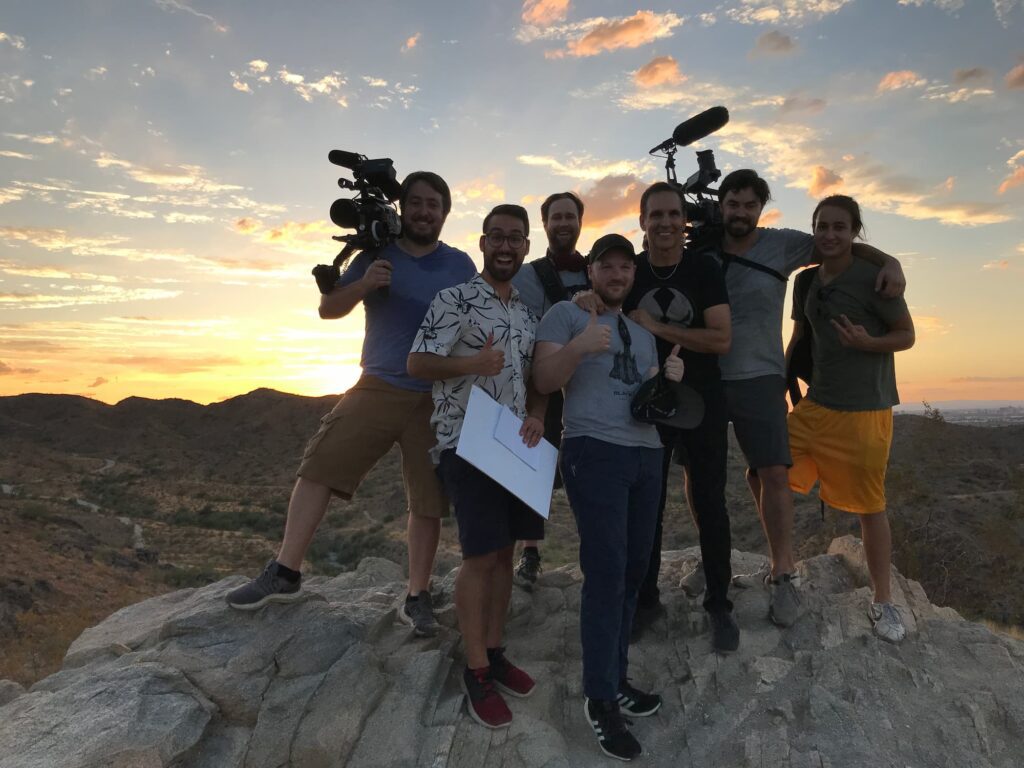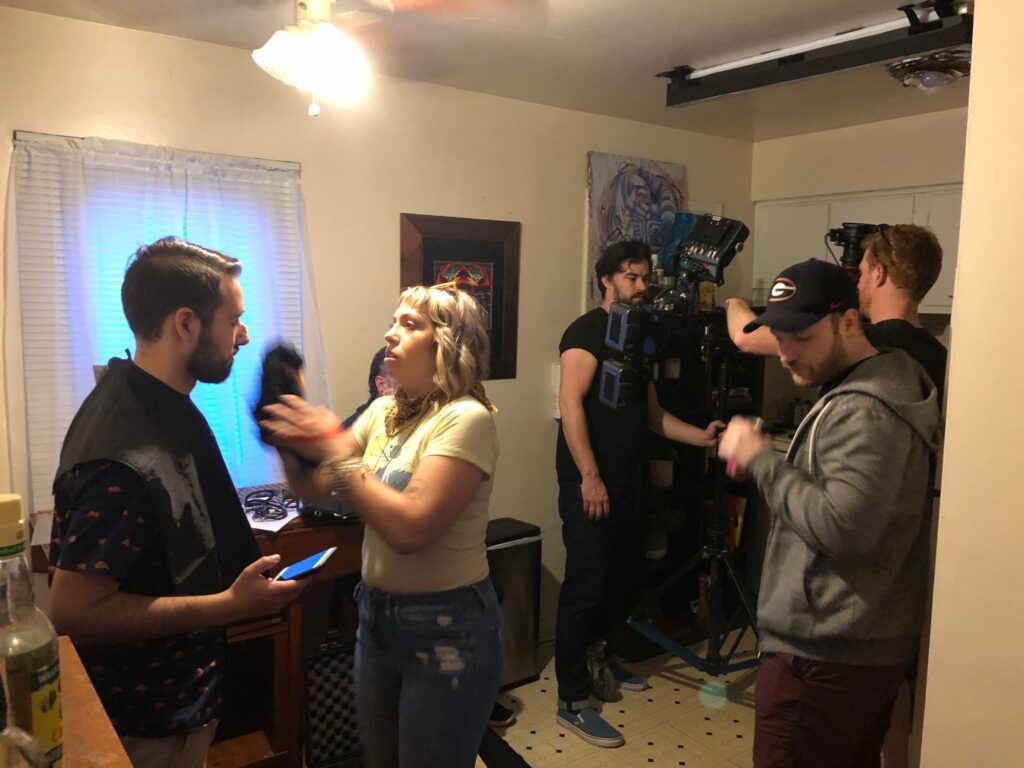Behind the Pitch: David Oster and “I Love Jazz”
For this month’s Behind the Pitch, The Film Fund founder Thomas Verdi sits down with filmmaker David Oster to discuss his background in film, how he got his start, and the eerie short film he made with $6,000 from The Film Fund.
David Oster and Thomas Verdi
January 29th, 2025
Thomas Verdi: Thanks for joining us, David. First question—can you tell us a little about yourself and your background in filmmaking?
David Oster: Absolutely. My name is David Oster. I’m originally from Atlanta, Georgia. I was one of those kids like J.J. Abrams—always running around with a camera, filming everything. I made short films with my friends all the time growing up. So, I fell in love with filmmaking at a young age. I studied it in school and made side money in college by creating videos for sororities. I was always making something.
Eventually, I landed a job on The Blind Side and then got an internship on Community. After that, it was kind of off to the races. I worked in production for a long time, starting as a PA and working my way up. I assisted a lot of directors, producers, and actors—mostly in Atlanta, but also on a show in Prague. I’ve worked on some big shows like Loki and The Hunger Games, and I learned a ton from those experiences.
In between, I focused on my own projects and did a lot of commercial work—spots for brands like Westin Hotels, Fiat, and Allstate, many of which were documentary-style. Eventually, I got to direct a feature documentary for Syfy on Todd McFarlane, the creator of Spawn. He’s a huge figure in the comic book world and has a massive toy company and multimedia brand. That doc aired on Syfy, and it was one of the biggest projects I’d done up to that point. That happened around the same time I participated in The Film Fund, actually.
I moved to LA in 2021. The pandemic shook everything up for a while, and then the strike happened, too. But I ended up working for a producer and then for a showrunner. I really wanted to be in a writers’ room, and I got the chance to do that for almost two years on a show called Teacup Peacock. Unfortunately, it got canceled, which was a bummer.

Thomas Verdi: That’s a wild journey—and definitely relatable. You never really know what’s going to inspire you to dive back into your own work again.
David Oster: Totally. The cancellation was tough, but I’ve been using the time to write more and focus on my own projects. It’s been a bit of a kick in the ass—in a good way.
Thomas Verdi: Love that mindset. And I’ve got to ask—do you remember how you first heard about The Film Fund? A lot of filmmakers say they don’t remember, especially the ones who participated early on.
David Oster: [Laughs] Yeah, I’m probably one of those people. But I think I was just researching film grants and ways to raise money. I had written this short called “I Love Jazz,” and I was going to make it no matter what. I just figured, hey—if I can find a partner or some extra funding, why not? I probably found The Film Fund just through that research—looking for opportunities to fund short films.
Thomas Verdi: Awesome. So, tell us about “I Love Jazz.” What’s it about, and what inspired it?
David Oster: It’s about a guy who buys a record—and the record is sort of… evil, but not in an obvious way. He starts playing it, and it gives him a warning that someone is coming to kill him. But he’s not sure if it’s real, or if the voice he’s hearing is actually his own. And then the things it’s warning him about slowly start to come true.
The initial idea came from wanting to make something with a limited location. I also really wanted to experiment with color. We used a lot of different lighting setups—changing color in-camera as the story unfolds. It turned into something a bit experimental, which was exactly what I was aiming for.
Thomas Verdi: Can you talk a bit more about the inspiration behind the film?
David Oster: Stephen King was definitely a big influence. I wanted to create a psychological horror piece, almost like a short story brought to life. We ended up casting Randy Havens, who plays the teacher in Stranger Things, which was amazing. We shot the entire thing to feel like one continuous take, so the viewer feels trapped in the moment—just like the character. We actually stitched a few shots together to pull that off, but the goal was to create this seamless, immersive experience using music, color, and cinematography.
Of course, there were things I learned along the way—things I’d do differently now. But I think most filmmakers can relate to that. You watch your film and cringe at stuff no one else even notices. [laughs]
Thomas Verdi: Totally.
David Oster: We also had to pivot a few times on the day of the shoot due to unexpected challenges. But I had a great crew. Our Steadicam operator actually went on to shoot Planet of the Apes, so I like to joke that I “discovered” him. [laughs]
My cinematographer also brought this amazing lighting setup. I had just watched Three Colours: Blue, and Paris, Texas, and I loved how those films used production design and costume color to tell the story. In Paris, Texas, you’ll notice red, white, and blue popping up throughout the whole film—it’s really intentional and artistic. I wanted to bring that same level of thoughtfulness to our short.

Thomas Verdi: That’s amazing. So, going back a few years now: how did the funding specifically help bring your project to life?
David Oster: It helped tremendously. It allowed us to get the equipment we needed, hire extra crew members, and build the props—like the record and the record player, which were really specific to the story. It also helped us in post-production. I can’t point to just one thing because it really enabled the whole production. It was invaluable.
Thomas Verdi: That’s great to hear. You touched on this earlier, but what were some of the biggest challenges during production, and how did you overcome them?
David Oster: The biggest challenge was definitely the one-take concept. That was part of the original pitch that got us the funding, so we were committed to making it work. In hindsight, I wish we had more prep time—though I’m sure every filmmaker says that.
David Oster: We did rehearse, but only with a phone during blocking. Once we got the actual camera rig in there, we realized it didn’t fit the same way. So we had to re-block everything. Then there were timing issues. For example, the actor flips a light switch, but the lights were controlled manually from another room and had a delay. That kind of stuff would ruin a full take.
Thomas Verdi: Wow.
David Oster: Yeah, so we ended up having him cover the switch with his hand to mask the timing better. Little adjustments like that made a huge difference. We also had to condense the script a bit to make it all work, but honestly, that helped the story flow smoother. The whole thing was a great learning experience in choreography and precision.
Thomas Verdi: I love that style. Birdman is one of my favorite films, and while it’s not really one [practical] continuous take, the prep work they put into it is wild. I watched the behind-the-scenes footage: they had to time everything down to the second.
David Oster: Same here. I gained a whole new appreciation for that style. When I worked on Loki, we had a one-take sequence in episode three, where Loki and Sylvie are running through the city. Each section was its own choreographed Steadicam shot. We rehearsed the hell out of it on weekends because we only had a short window to shoot it.
Thomas Verdi: So what I’m hearing is: The Film Fund is responsible for the success of the long takes in Loki. [laughs]
David Oster: [laughs] Yeah, let’s go with that. It didn’t hurt. But seriously, I’m really thankful for the opportunity. I learned so much from doing it myself and then got to apply that knowledge on a big production like Loki. The Film Fund definitely played a role in that journey.
Thomas Verdi: What impact would you say your project has had since its completion?
David Oster: It’s definitely helped me land other projects and given me something solid to show for my work. I recently worked on a show called Teacup with a lot of folks from the horror world—people associated with Atomic Monster, Blumhouse, things like that. One of our writers, who’s friends with Randy Havens and is married to David Bruckner (he directed The Ritual and the Hellraiser reboot), really loved the short film. Bruckner even watched it, which was huge for me. It’s helped me make connections and legitimize myself in the space. This year, I’m focusing heavily on writing and building my portfolio.
Thomas Verdi: That’s so cool.
David Oster: It’s been a bit of a roller coaster, especially between COVID and now, but I think a lot of people can relate to that. The short film has been a great calling card for me. That same year, I also did a documentary with Todd McFarlane, which really built on that momentum. It kept me moving forward as a filmmaker during a tough time.
Thomas Verdi: What advice do you have for filmmakers entering The Film Fund?
David Oster: I’d say be bold with your idea—do something that makes you stand out. I don’t know if it’s still the same process?
Thomas Verdi: Yep, same exact process. The only change we made was raising the entry fee for a while, but I found that it was a little too much, so it’s back down to $25. We also offer feedback now. But yeah—still one sentence describing your premise and how you’d use the funding.
David Oster: Then my advice would be: ask yourself, Would I want to make this if I just read that one sentence? Because that’s all you’ve got, and how you present it is everything. Be realistic with your budget, too. But know that The Film Fund is real—it can absolutely help you if you get it. And I think you’re sincerely interested in helping filmmakers, Thomas. You’re still doing it, it’s growing, and if anyone entering wants to reach out to past winners, I’d be happy to chat or offer guidance.
Thomas Verdi: That’s a great answer.

David Oster: Yeah, anyone from The Film Fund network—I’m happy to help.
Thomas Verdi: In terms of crafting that one-sentence pitch, what’s your best tip?
David Oster: Be visual. Try to paint a picture that captures the theme and tone of the film as clearly as you can. Whoever’s reading it needs to be able to see the movie in their head from just that sentence.
Thomas Verdi: Yeah, totally. You don’t have a lot of space, but you kind of do—because every word counts. Each word can invoke a visual, a tone, a feeling. That’s what we’re looking for: a glimpse into the world of the project.
David Oster: Exactly.
Thomas Verdi: I think you already touched on this, but my next question was: what are your next steps in your creative journey?
David Oster: Yeah, I’m doing a lot of writing right now. I’ve got a writing partner who works at a production company run by a pretty well-known actor, and we’re developing a project together. Since moving to L.A., I’ve gotten into writers’ rooms and built some great relationships—like with one showrunner I worked closely with. Unfortunately, the show we were on got cancelled, which was a bummer, but I made a lot of connections through that job. I’ve been focused on establishing myself here and now that we’re through the strikes, I’m trying to leverage the networking I’ve done to move forward with my own work.
It’s been a weird time for the industry. Everyone’s trying to figure out how to break in or make something happen. AI’s a big topic, and I’m always trying to keep up with what’s happening there, but the biggest shift is really the business model—especially around streaming. Now that the strikes are over and these platforms are bringing ads into the mix, I think we’ll start seeing more money flowing into new projects.
The question is: how do we bring productions back to the U.S.? Incentivize them, make them cost-effective. Right now, so many are going to places like Bulgaria. No disrespect to Bulgaria—I’ve worked in Prague—but a lot of my friends in production haven’t worked consistently in a while. I’m hopeful things will pick up here again.
Thomas Verdi: Yeah, I’ve heard a lot of optimism on that too. Some people say the industry’s in flux, but I’m optimistic. Hopefully we do start bringing more production back to the States.
David Oster: I don’t think AI is the big disruptor right now—it’s the overall business model. For a while, everyone was focused on subscriptions, but now that they’re adding ads, they’ve got two revenue streams. That should lead to more money and more content. Nobody wanted to be the first to add ads, thinking users would bail, but now they’ve all jumped in.
Thomas Verdi: Right, exactly.

David Oster: It just makes sense—more ways to make money means more opportunities. I also think the types of content might change to fit ad models better. Like with Teacup, we had eight episodes, but a lot of these short-season shows just get canceled after one season. That frustrates viewers.
Thomas Verdi: Yeah, people get into the story, and then it’s gone.
David Oster: Exactly. If that’s going to be the model, maybe they need to consider longer season orders. If ads bring in more money per episode, maybe it makes sense to invest in longer runs.
Thomas Verdi: Totally.
David Oster: Of course, they’ll want to focus on big hits—like a Buffy the Vampire Slayer reboot or something. But yeah, if there’s money to be made, they’ll figure it out.
Thomas Verdi: You mentioned a new project you’re working on—are you able to share anything about that yet?
David Oster: It’s a little early, but I can say one of them is a psychological thriller about two actors. It has some horror elements—think True Detective meets Perfect Blue. It explores the darker side of pain and performance. Basically, imagine two actors who’ve worked together in a bunch of romantic films, and someone starts recreating murder scenes based on those movies.
Thomas Verdi: Whoa, okay.
David Oster: And it’s all framed as a true crime documentary. It plays with timelines and perspectives—kind of in the True Detective vein. That’s one project. The other is a sports drama with some crime elements mixed in.
Oh—and one more thing I’ve been working on is a party card game. I made it with the producer from I Love Jasp and our [Todd McFarlane] documentary. We created it during COVID just for fun, but our friends loved it and encouraged us to make it real. So, we ran a Kickstarter, and now it’s on Amazon. It’ll be two years on the market this April.
Thomas Verdi: That’s so cool. I was going to ask—can you send me the link? I’d love to include it.
David Oster: Yeah, absolutely. We’ve even used some of our Hollywood connections to get holiday orders. Last December was great for us.
Thomas Verdi: That’s great.
David Oster: It’s a lot of fun because the game is essentially a Mad Lib-style movie pitch. You fill in the Mad Lib with your cards—that becomes your movie pitch. Then, everyone else has cards they can use to ask you questions about your movie, and you just make it up as you go. So it’s like improv meets Mad Libs, but with movies. It’s super fun—great for three to six players, though you can play with more.
There’s a “budget” mechanism—everyone pitches their movie, then gives their highest-budget card to their favorite pitch. Whoever ends up with the highest total budget wins. If you have more than six players, you can still play—just skip the budget part. But yeah, it’s a really fun time.
Thomas Verdi: Cool. I’ll definitely check it out.
David Oster: If you love movies and being creative, it gives you a great framework to come up with fun ideas.
Thomas Verdi: Yeah, that sounds awesome. I love movies and games, so I’m definitely going to grab it. I’ll be sure to include the name—it’s called Made Up Movies, right?
David Oster: Yep!

Thomas Verdi: My next question—I’ll actually just answer this one. Where can people view your winning project or other work? It’s right on The Film Fund website, so I’ll include the link. And as far as connecting with you for advice or collaboration—what’s the best way for people to follow your journey online? Instagram? A website?
David Oster: Yeah, my Instagram is @capnds—short for “Captain D’s.” It’s kind of an inside joke, but nobody else has that name, so it works. My X/Twitter handle is @d_str. And my website is davidoster.org, where you can also find my contact info if anyone wants to reach out directly.
Thomas Verdi: What’s the most valuable lesson you learned from your experience with The Film Fund?
David Oster: Honestly, the biggest lessons came from just doing the project. As a filmmaker, you learn the most when you actually make something. You can read every book, watch the best directors and actors in the world—but until you’re under that pressure, you don’t fully get it. Directing puts you in a unique position of responsibility that no one else on set experiences. And even doing that short film, “I Love Jazz,” helped prepare me for my next project—a much bigger documentary for the Syfy Channel. That project had a larger budget and a lot more logistical challenges. Just getting through the short film—handling the budget, solving problems—gave me the confidence to move forward. I learned a lot about myself, my taste, and my capabilities as a director.
Thomas Verdi: Yeah, I totally relate. I initially read all of these books—The Location Sound Bible, Master Shots, tons of stuff. But when I got on set, I had no idea what I was doing. My film sucked. But you learn. And you feel that pressure—like, “Oh no, everyone’s looking at me. I have to figure this out.” That process is so important. And it’s amazing to hear that your Film Fund short helped set you up for a major documentary. That’s awesome.
David Oster: Yeah, and I was able to bring a lot of great people from that project onto the next one. I’ve heard Tarantino talk about this: there are plenty of things I don’t know how to do, but as a director, the most important thing is casting the right people for your departments, just like you cast actors. Then, it’s about communicating your vision so that your team can bring ideas you hadn’t even imagined. That’s what filmmaking is.
Thomas Verdi: 100%. It’s not always about what you do in the moment on set. A lot of it happens in pre-production. You’ve already strategized, you’ve had the vision conversations. The people are there to execute. So it’s not just being the quarterback. You’re the offensive coordinator, the head coach. The groundwork has already been laid.
David Oster: Exactly. Prep and who you bring on are everything. Seems like common sense, but you only really learn it by doing. I had some amazing collaborators—and a few people I probably should’ve replaced. But you learn. You also learn what you’re capable of, how to improve, what mistakes you made, and how to do it better next time. Even George Lucas keeps editing Star Wars. That’s just part of being a filmmaker.

Thomas Verdi: Couldn’t agree more. Okay, last question—super easy: is there anything else you’d like to share with the community or aspiring filmmakers?
David Oster: First thing—buy my game. I think you’ll love it.
Thomas Verdi: [laughs] What’s it called again?
David Oster: Made Up Movies: The Party Game of Ridiculous Reboots.
Thomas Verdi: Perfect.
David Oster: If you like movies, I think you’ll really enjoy it. And also, don’t get discouraged. There’s a lot of uncertainty in the industry right now. I’ve been having a ton of conversations about it. But I believe things are on the upswing. Now is the time to make that thing you’ve been wanting to make. Now is the time to apply to The Film Fund. There’s always a need for original content. Independent film is strong. Most studios make only about 10% of their content in-house. The rest? They acquire it.
Thomas Verdi: Yeah, I saw this entire section of an On Demand platform filled with independent films. One of them was by another Film Fund winner, Mike Gerbino—he expanded his short into a feature, and it was up there. I was so excited to see it. It just shows—there’s a huge market. People are craving something different. No shade to Marvel, but a lot of folks are tired of the same formula. Indie film is where the innovation happens.
David Oster: Exactly. That’s where truly unique work gets made. Just look at this year’s indie features—The Substance was wild, The Brutalist was incredible. There’s so much compelling work out there.
Thomas Verdi: 100%. David, thank you again. I was about to wrap this up like it’s a podcast—but then I remembered, I can just hit the stop button!
David Oster: Haha, we made great time.
Thomas Verdi: Yeah, perfect.